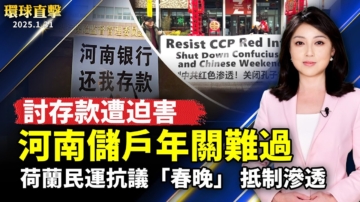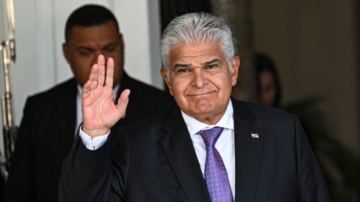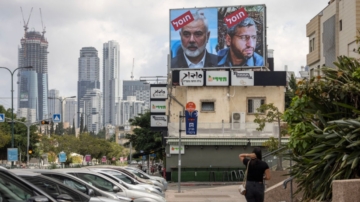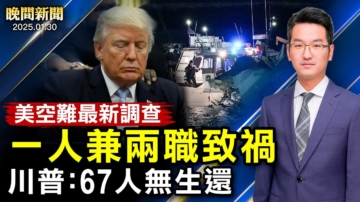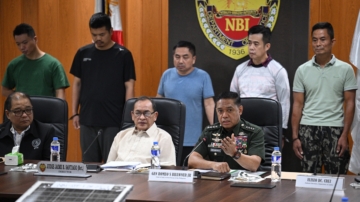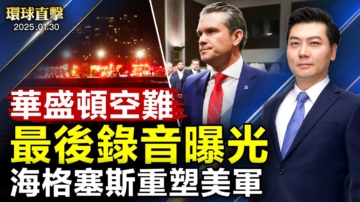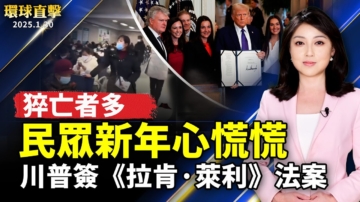【新唐人2014年02月25日訊】這幾天,烏克蘭政局巨變成為全世界媒體的焦點。烏克蘭原政府對抗議民眾暴力清場,但軍方拒絕屠殺民眾。這讓不少中國人想起了1989年的六四天安門屠殺。從烏克蘭人民身上中國人得到了甚麼啟發?現在中國人為甚麼相信體制內的軍人也在覺醒?請看詳細內容。
24號,來自烏克蘭的最新消息是:烏克蘭臨時政府簽發逮捕令,以「屠殺罪」通緝前總統亞努科維奇。在民間,烏克蘭民眾把混進抗議人群中打、砸、搶、燒的便衣軍人,抓起來示眾。
烏克蘭國會22號已經罷黜了亞努科維奇的總統職務,並釋放反對派領袖——前總理季莫申科。烏克蘭國會確定在今年5月25號舉行大選。季莫申科被認為將會參選。
據了解,22號當天亞努科維奇打算搭機逃往俄羅斯時,被邊境警察攔截。亞努科維奇目前行蹤不明。同一天,季莫申科獲釋後,直接前往烏克蘭首都基輔市中心的獨立廣場。在反政府抗議者們的歡迎聲中,她盛讚烏克蘭人民是改變歷史的英雄。
烏克蘭變天的過程,令很多中國人回想起,1989年中共在北京天安門廣場的「六四屠殺」事件。當年中共軍隊開槍掃射學生群眾,但是,也出現38軍少將徐勤先軍長拒絕屠殺老百姓而被判刑的情況。
孫文廣:「最主要的,中國的民眾應該認識,你要爭自由、爭民主、要維權。最重要的方式就是民眾聯合起來,用示威的方式爭取這些權利。因為它沒有辦法完全阻止民眾上廣場。」
22號,反政府的抗議民眾呼籲烏克蘭徹底「取締共產黨」,並指控共產黨是「犯罪組織」。有抗議民眾抓到開槍的兇手後,把他按倒跪地,命令他對死難者懺悔謝罪。季莫申科表示,對屠殺者要嚴懲。
原山東大學教授孫文廣:「現在中國大陸這個事情很有意義。在這個威權的國家,沒有充分實行民主自由,早晚民眾會起來反抗,改變這種統治的模式。中國的民眾要有些勇敢精神,要向烏克蘭的這些廣場上的英雄學習。」
大陸南方街頭運動倡導者王愛忠:「走向民主肯定是一個歷史的潮流,中共也擋不住。目前南方街頭運動蓬勃興起,走上街頭的人是越來越多。未來的中國,通過民眾大規模的街頭運動結束一個政權,我覺得這是可能的一種途徑。」
去年11月,亞努科維奇暫停了烏克蘭和歐盟的聯盟協議,並親近俄羅斯,烏克蘭民眾因此爆發了全國範圍的大規模抗議示威活動。今年2月18號開始的民眾抗議,22號遭到了烏克蘭當局的暴力鎮壓。
視頻顯示,烏克蘭當局對手無寸鐵的抗議民眾開槍,連救護人員都被打。目前已知有82人遇難。22號,烏克蘭四大安全機關的負責人一致向議會承諾,不會干預政府和反對派之間的衝突。
大陸網友「華夏匹夫」認為,警察、軍隊的反戈一擊,對烏克蘭的政局變化起到了很大的作用。他注意到中國民間的普遍覺醒影響了體制內的群體。當民間覺醒的力量壯大到了一定程度時,體制內覺醒的人會爆髮式的出現。
大陸南方街頭運動倡導者王愛忠認為,當今的中國人對中共暴政的覺知能力,與「六四」當年相比,已經今非昔比。
王愛忠:「20年前跟現在情況已經完全不一樣。因為網路信息的暢通,民眾,包括甚至軍方、政府部門都發生了改變。中共再像六四那樣,首先國際社會也不會允許他們這麼幹﹔第二,軍方跟警察也不會這麼幹,會站到人民這一邊,跟烏克蘭一樣。」
美國《大紀元》新聞網2004年底推出系列社論《九評共產黨》,隨後引發中國人的「退黨大潮」。到目前為止,已有1億5千8百多萬人,在《大紀元退黨網站》聲明退出中共的黨、團、隊組織。其中包括大量中共體制內的各級官員。
採訪編輯/唐音 後製/鍾元
Ukrainian Army Stays out of Domestic Political Crisis,
A Hit to the Chinese Communist Regime
Political upheaval in Ukraine continues to draw world attention.
Ukraine's former government violently has suppressed protesters,
but the Ukrainian army refuses to massacre the people, making
many Chinese think of the 1989 Tiananmen Square massacre.
What inspiration have the Chinese gained from Ukraine's army?
Why are Chinese saying Chinese soldiers are also awakening?
Our reporter has the story.
The Ukraine interim government has issued an arrest warrant
for former president Viktor Yanukovich for mass murder
in the latest developments in Ukraine.
On the streets, undercover officials conducted beating, smashing,
looting, and burning during the protests were arrested and
put under public display.
Ukrainian parliament ousted president Yanukovych, released
opposition leader and former prime minister Yulia Tymoshenko
on Feb. 22, and decided on an early election for May 25.
Tymoshenko will likely run for the presidency.
Former president Yanukovych was said by Ukrainian officials
to have been stopped by border police while attempting to fly
to Russia aboard a private plane.
Yanukovych has since gone missing.
On the same day, Yulia Tymoshenko went directly
to the capital, Kiev's Independence Square.
In a hail of the anti-government protesters,
she told the crowd that they are the heroes.
The Ukrainian political struggle has reminded many Chinese
of the June 4 massacre on Beijing's Tiananmen Square in 1989,
when the People's Liberation Army opened fire at the students.
But commander Xu Qinxian of the 38th Group Army
refused to use force against the demonstrators and
was then court-martialed, and jailed for five years.
Sun Wenguang, former Shandong University professor: "Most
importantly, the Chinese should know that to fight for freedom,
democracy and rights, people must unite and fight for it with
demonstrations. No demonstration can be completely stopped."
The protesters have called on Ukraine to completely
liquidate the Communist Party,
and accused the Communist Party of being a criminal group.
A sniper was reportedly caught by the anti-government
protesters and forced to apologize and repent to the victims.
Tymoshenko also said that those behind the violence must be
punished.
Professor Sun Wenguang: "The Ukraine incident holds
great meaning for China.
Without freedom or democracy, sooner or later, people under
an authoritarian state will revolt and change the ruling.
The Chinese must be brave and learn from the heroes in the
Kiev's Independence Square."
Wang Aizhong, Southern Street Movement activist: "Democracy
is a historical trend that the Communist regime can not stop.
In China, more and more people are taking to the streets
following the Southern Street Movement.
I think it's likely for China to end the dictatorship through
mass protests in the streets."
Ukraine's ex-president Yanukovych's shelving an agreement
with the EU in November and instead turning to Russia
is what set off the wave of protests throughout Ukraine.
Protesters began meeting violent crackdowns of deadly force
by the government from Feb. 18 to 22.
An online video shows Ukrainian authorities opening fire
on the unarmed protesters, even the medics.
So far, at least 82 people are known to have been killed.
On Feb. 22, the Ukrainian parliament was guaranteed by the
security chiefs of the country that they would not intervene
in the country's political crisis.
Chinese netizen Huaxia Pifu posted on the Internet that
the Ukrainian police and military's stepping back from
the crackdown has played a significant role to the country.
He noted the impact widespread awakening among Chinese
has had on the people within the system.
When the societal awakening has grown power, the awakening
within the system will occur in an explosive way.
South Street Movement activist Wang Aizhong believes the
Chinese today have a much clearer understanding of the
tyranny of the Communist regime than the Chinese in 1989.
Wang Aizhong: "A lot has changed since 20 years ago.
The Internet era and free flow of information have changed
the people, the army, and the government.
The international community will not tolerate another
massacre incident like that of 1989.
The army and the police will also stand with the people,
like those in Ukraine."
Since the editorial series Nine Commentaries on the
Communist Party was published by the Epoch Times in 2004,
waves of Chinese have been quitting the Communist Party.
Many Chinese officials of various governmental levels
are among the more than 158 million Chinese who have quit
and denounced the CCP and its associated organizations.
Interview & Edit/Tang Yin Post-Production/Zhong Yuan
24號,來自烏克蘭的最新消息是:烏克蘭臨時政府簽發逮捕令,以「屠殺罪」通緝前總統亞努科維奇。在民間,烏克蘭民眾把混進抗議人群中打、砸、搶、燒的便衣軍人,抓起來示眾。
烏克蘭國會22號已經罷黜了亞努科維奇的總統職務,並釋放反對派領袖——前總理季莫申科。烏克蘭國會確定在今年5月25號舉行大選。季莫申科被認為將會參選。
據了解,22號當天亞努科維奇打算搭機逃往俄羅斯時,被邊境警察攔截。亞努科維奇目前行蹤不明。同一天,季莫申科獲釋後,直接前往烏克蘭首都基輔市中心的獨立廣場。在反政府抗議者們的歡迎聲中,她盛讚烏克蘭人民是改變歷史的英雄。
烏克蘭變天的過程,令很多中國人回想起,1989年中共在北京天安門廣場的「六四屠殺」事件。當年中共軍隊開槍掃射學生群眾,但是,也出現38軍少將徐勤先軍長拒絕屠殺老百姓而被判刑的情況。
孫文廣:「最主要的,中國的民眾應該認識,你要爭自由、爭民主、要維權。最重要的方式就是民眾聯合起來,用示威的方式爭取這些權利。因為它沒有辦法完全阻止民眾上廣場。」
22號,反政府的抗議民眾呼籲烏克蘭徹底「取締共產黨」,並指控共產黨是「犯罪組織」。有抗議民眾抓到開槍的兇手後,把他按倒跪地,命令他對死難者懺悔謝罪。季莫申科表示,對屠殺者要嚴懲。
原山東大學教授孫文廣:「現在中國大陸這個事情很有意義。在這個威權的國家,沒有充分實行民主自由,早晚民眾會起來反抗,改變這種統治的模式。中國的民眾要有些勇敢精神,要向烏克蘭的這些廣場上的英雄學習。」
大陸南方街頭運動倡導者王愛忠:「走向民主肯定是一個歷史的潮流,中共也擋不住。目前南方街頭運動蓬勃興起,走上街頭的人是越來越多。未來的中國,通過民眾大規模的街頭運動結束一個政權,我覺得這是可能的一種途徑。」
去年11月,亞努科維奇暫停了烏克蘭和歐盟的聯盟協議,並親近俄羅斯,烏克蘭民眾因此爆發了全國範圍的大規模抗議示威活動。今年2月18號開始的民眾抗議,22號遭到了烏克蘭當局的暴力鎮壓。
視頻顯示,烏克蘭當局對手無寸鐵的抗議民眾開槍,連救護人員都被打。目前已知有82人遇難。22號,烏克蘭四大安全機關的負責人一致向議會承諾,不會干預政府和反對派之間的衝突。
大陸網友「華夏匹夫」認為,警察、軍隊的反戈一擊,對烏克蘭的政局變化起到了很大的作用。他注意到中國民間的普遍覺醒影響了體制內的群體。當民間覺醒的力量壯大到了一定程度時,體制內覺醒的人會爆髮式的出現。
大陸南方街頭運動倡導者王愛忠認為,當今的中國人對中共暴政的覺知能力,與「六四」當年相比,已經今非昔比。
王愛忠:「20年前跟現在情況已經完全不一樣。因為網路信息的暢通,民眾,包括甚至軍方、政府部門都發生了改變。中共再像六四那樣,首先國際社會也不會允許他們這麼幹﹔第二,軍方跟警察也不會這麼幹,會站到人民這一邊,跟烏克蘭一樣。」
美國《大紀元》新聞網2004年底推出系列社論《九評共產黨》,隨後引發中國人的「退黨大潮」。到目前為止,已有1億5千8百多萬人,在《大紀元退黨網站》聲明退出中共的黨、團、隊組織。其中包括大量中共體制內的各級官員。
採訪編輯/唐音 後製/鍾元
Ukrainian Army Stays out of Domestic Political Crisis,
A Hit to the Chinese Communist Regime
Political upheaval in Ukraine continues to draw world attention.
Ukraine's former government violently has suppressed protesters,
but the Ukrainian army refuses to massacre the people, making
many Chinese think of the 1989 Tiananmen Square massacre.
What inspiration have the Chinese gained from Ukraine's army?
Why are Chinese saying Chinese soldiers are also awakening?
Our reporter has the story.
The Ukraine interim government has issued an arrest warrant
for former president Viktor Yanukovich for mass murder
in the latest developments in Ukraine.
On the streets, undercover officials conducted beating, smashing,
looting, and burning during the protests were arrested and
put under public display.
Ukrainian parliament ousted president Yanukovych, released
opposition leader and former prime minister Yulia Tymoshenko
on Feb. 22, and decided on an early election for May 25.
Tymoshenko will likely run for the presidency.
Former president Yanukovych was said by Ukrainian officials
to have been stopped by border police while attempting to fly
to Russia aboard a private plane.
Yanukovych has since gone missing.
On the same day, Yulia Tymoshenko went directly
to the capital, Kiev's Independence Square.
In a hail of the anti-government protesters,
she told the crowd that they are the heroes.
The Ukrainian political struggle has reminded many Chinese
of the June 4 massacre on Beijing's Tiananmen Square in 1989,
when the People's Liberation Army opened fire at the students.
But commander Xu Qinxian of the 38th Group Army
refused to use force against the demonstrators and
was then court-martialed, and jailed for five years.
Sun Wenguang, former Shandong University professor: "Most
importantly, the Chinese should know that to fight for freedom,
democracy and rights, people must unite and fight for it with
demonstrations. No demonstration can be completely stopped."
The protesters have called on Ukraine to completely
liquidate the Communist Party,
and accused the Communist Party of being a criminal group.
A sniper was reportedly caught by the anti-government
protesters and forced to apologize and repent to the victims.
Tymoshenko also said that those behind the violence must be
punished.
Professor Sun Wenguang: "The Ukraine incident holds
great meaning for China.
Without freedom or democracy, sooner or later, people under
an authoritarian state will revolt and change the ruling.
The Chinese must be brave and learn from the heroes in the
Kiev's Independence Square."
Wang Aizhong, Southern Street Movement activist: "Democracy
is a historical trend that the Communist regime can not stop.
In China, more and more people are taking to the streets
following the Southern Street Movement.
I think it's likely for China to end the dictatorship through
mass protests in the streets."
Ukraine's ex-president Yanukovych's shelving an agreement
with the EU in November and instead turning to Russia
is what set off the wave of protests throughout Ukraine.
Protesters began meeting violent crackdowns of deadly force
by the government from Feb. 18 to 22.
An online video shows Ukrainian authorities opening fire
on the unarmed protesters, even the medics.
So far, at least 82 people are known to have been killed.
On Feb. 22, the Ukrainian parliament was guaranteed by the
security chiefs of the country that they would not intervene
in the country's political crisis.
Chinese netizen Huaxia Pifu posted on the Internet that
the Ukrainian police and military's stepping back from
the crackdown has played a significant role to the country.
He noted the impact widespread awakening among Chinese
has had on the people within the system.
When the societal awakening has grown power, the awakening
within the system will occur in an explosive way.
South Street Movement activist Wang Aizhong believes the
Chinese today have a much clearer understanding of the
tyranny of the Communist regime than the Chinese in 1989.
Wang Aizhong: "A lot has changed since 20 years ago.
The Internet era and free flow of information have changed
the people, the army, and the government.
The international community will not tolerate another
massacre incident like that of 1989.
The army and the police will also stand with the people,
like those in Ukraine."
Since the editorial series Nine Commentaries on the
Communist Party was published by the Epoch Times in 2004,
waves of Chinese have been quitting the Communist Party.
Many Chinese officials of various governmental levels
are among the more than 158 million Chinese who have quit
and denounced the CCP and its associated organizations.
Interview & Edit/Tang Yin Post-Production/Zhong Yuan

